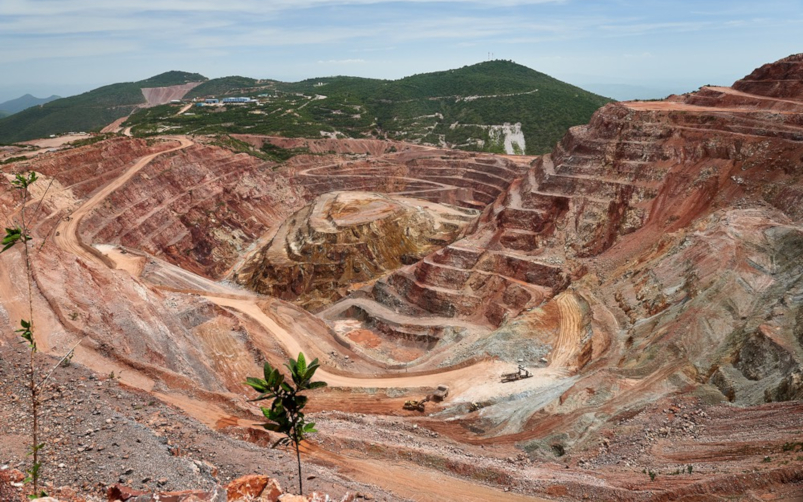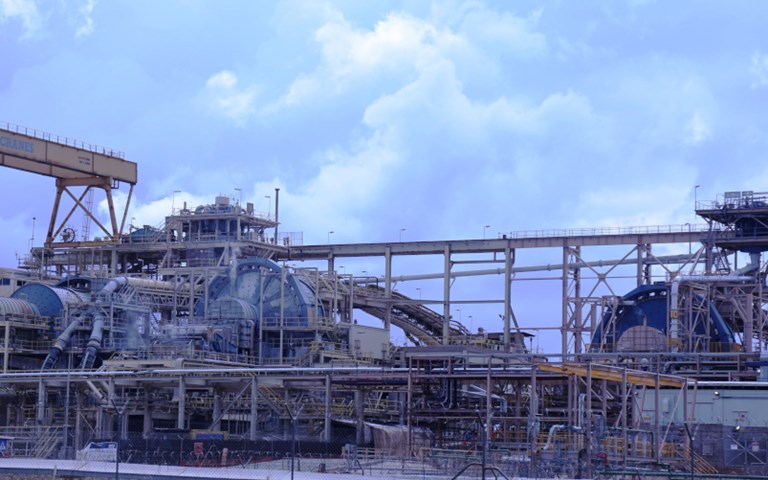Newmont Goldcorp's Ahafo Mill expansion in Ghana is expected to expand mill capacity by more than 50 per cent. Courtesy of Newmont Goldcorp.
(Like what you’re reading? Get our weekly recap delivered straight to your inbox each Friday)
Welcome back to your weekly mining news recap, where we catch you up on some of the news you may have missed. This week’s headlines include planning for the future in the oil sands, questions over mine remediation funding, and production starts for Newmont Goldcorp and Teranga.
In-situ extraction has proven to be a valuable technique for recovering bitumen in the Athabasca region too difficult to access by traditional means. However, the carbon footprint generated by in-situ extraction is a liability, and big oil companies are developing new technologies to reduce the environmental cost of in-situ. Solvents to reduce greenhouse gas emissions and SAGD upgrades are some of the new technologies coming to the oil sands.
Between the carbon tax, the Trans Mountain and the now-enacted Bill C-69, Alberta and the oil sands have found themselves at the centre of some of Canada’s biggest current political issues. With the recent election of United Conservative Party leader Jason Kenney as Alberta’s premier, we give you a run-down on the state of politics in Canada’s oil patch.
Last on our oil sands triple feature: closing a tailings facility can be made much more difficult when a mine’s design doesn’t take its eventual closure into account. Doubly so for tailings created by oil extraction operations, which produce tailings that contain a portion of fine solids that stay in suspension. Mine closure designer Neeltje Slingerland explains how better tailings planning can save money and headaches when it comes to reclamation in the future.
Monarch Gold has updated the mineral resource estimate for its Monique property near Val-d’Or, Quebec. According to the estimate, Monique contains inferred pit-contained resources of 307,000 ounces of gold from 5,583,000 tonnes grading at 1.71 grams per tonne, as well as 354,400 ounces of inferred underground resources from 3,543,300 tonnes grading at 3.11 grams per tonne. At current gold prices, Monarch president and CEO Jean-Marc Lacoste said Monique “has the potential to become a new million-ounce gold deposit in the Abitibi mining camp.”
Newmont Goldcorp announced that its Ahafo Mill expansion project in Ghana successfully processed its first ore. The expansion is expected to increase annual gold production at the Ahafo mine by between 75,000 and 100,000 ounces for the first five years and expand mill capacity by more than 50 per cent. The mill expansion brings the mine’s annual production total to between 550,000 and 650,000 ounces per year and is set to achieve commercial production in the fourth quarter of this year.
Yamana Gold has updated the mineral reserve estimate for its Jacobina mine in Brazil to 2,279,000 ounces of gold based on total proven and probable reserves of 29,588,000 tonnes at 2.4 grams per tonne. This represents an 8.6 per cent increase compared to the end of 2018. The company also showed continued results from its exploration program near the mine, and stated that a pre-feasibility study for a phase 2 expansion should be completed in the first quarter of 2020.
Teranga Gold announced that its second mine, the Wahgnion gold operation in Burkina Faso, has begun to process ore two months ahead of schedule. According to Teranga president and CEO Richard Young, the project was taken from exploration to production in less than three years after the company purchased the property in 2016. Wahgnion is expected to have a 13-year mine life and to produce 30,000 to 40,000 ounces of gold this year.
Eldorado Gold has confirmed the receipt of electromechanical installation permits for its Skouries project and an installation permit for its Olympias mine from the Greek Ministry of Energy and Environment. This represents a step forward for Eldorado, as the company has been held up by the government permitting process at Skouries and Olympias for several years. Eldorado said it is working with the Greek government to move forward with restarting full construction at Skouries.
The Federal Court of Appeal has allowed six new appeals of the Trans Mountain pipeline expansion to proceed, as reported by the Financial Post. The six appeals were all brought by affected First Nations groups who felt that the government did not fulfill its duty to consult, a charge that was accepted by the Federal Court of Appeal when the pipeline project was quashed in August 2018. The appeals aren’t likely to halt construction of the project in the meantime.
Back in August, the Canadian government announced $2.2 billion in funding to clean up eight abandoned mine sites in the Yukon and Northwest Territories. The Saskatchewan government, however, is not pleased about this, as reported by the Saskatoon StarPhoenix. Saskatchewan premier Scott Moe asked why the funding wouldn’t provide funds for the Gunnar uranium mine in northern Saskatchewan. According to federal Northern Affairs Minister Carolyn Bennett, who announced the funding, abandoned mines in the south are owned by the provinces, but mines in the north are specifically a federal concern.
If you’ve got feedback, you can always reach us at editor@cim.org. If you’ve got something to add, why not join the conversation at our Facebook, Twitter or LinkedIn pages?



